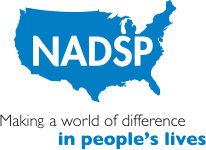NADSP Training
NADSP has created the following keynote addresses and training options to ensure that DSPs and other support providers continue to receive critical training and professional development throughout the COVID-19 pandemic and beyond.
NADSP Keynote Presentations
NADSP offers a number of keynote presentations about topics related to the direct support professional (DSP) workforce.
- The Emerging Roles & Changing Expectations of the Direct Support Workforce
- Practical Applications for Hiring, Developing, Keeping and Empowering DSPs
- Re-Building a Direct Support Workforce in a Post-Pandemic Environment
NADSP Virtual Training
These 3-hour virtual training events can be purchased by an organization so that its own employees gain the insight and expertise that only the NADSP can provide. The trainings are delivered through the video communications platform Zoom, and have a 500 attendee capacity limit.
- 3-hour training events
- 4 different training topics
- Bundling options available
- Up to 500 attendee capacity
- Only an agency’s internal employees can attend
Creating a Culture of Competency
In this engaging and interactive training session, join the NADSP staff to learn the latest best practices in direct support that go well beyond the regulations and state-level requirements for this profession. Most training and development for direct support professionals (DSPs) focuses on regulatory and mandated topics. By embracing the NADSP Code of Ethics and focusing on nationally-validated NADSP Competency Areas, direct support professionals and organizations can ensure that they are supporting personal autonomy, access to integrated settings, informed choices and person centered practices.
Objectives:
- Introduce participants to the NADSP Competencies and Code of Ethics
- Discuss the process of how to create systems in an organization to be more responsive to the developmental and professional needs of direct support professionals
- Encourage direct support professionals to take responsibility in their professional development by embracing the Competencies and the Code of Ethics
An Introduction to The NADSP Code of Ethics
The knowledge and skills of direct support practice must be joined with the ethical principles to create the environment needed to fully support people in making life choices. To do so effectively, we must all recognize direct support professionals (DSPs) as professionals who have values, skills, and knowledge that constitute a unique and important profession, and who can infuse these beliefs into practice. This is an introduction to the NADSP Code of Ethics and will explore the nine parts (tenets) of the code and offer participants ideas for incorporating the use of the Code of Ethics in everyday direct support practice.
Objectives:
- Introduce participants to the NADSP Code of Ethics
- Explore typical ethical dilemmas that direct support professionals experience and see how the use of the Code can guide them through such difficult times
- Share methods and practices that can embed the Code into the daily function of direct support professionals
Informed Decision Making: An Introduction
Relationships, privacy, sexuality, well-being and in many other areas, people with intellectual and developmental disabilities should be supported in making informed decisions. This must take place while helping them with understanding the associated risks and responsibilities that are tied to those decisions. The skill of Informed Decision Making will be introduced to participants in this session.
Objectives:
- Define what Informed Decision Making consists of in the role of the direct support professional
- Explore the NADSP ‘Five Step Decision Making Process’ and offer best practices for using this technique
- Discuss how Informed Decision Making is related to the Centers for Medicare and Medicaid Services (CMS) Final Settings Rule and how it can help with compliance
Understanding and Implementing Career Ladders
There are many issues affecting the Direct Support Professional (DSP) workforce, including high turnover, low financial compensation, limited benefits, decreased job satisfaction, lacking employee appreciation, and more. Evidence suggests that employees who complete rigorous workforce development programs will stay on the job longer and provide a higher quality of support for people. In this session, NADSP staff will share the importance of competency-based career ladders for DSPs. The NADSP E-Badge Academy will also be explained and explored.
Objectives:
- Learn the best practices and possible challenges in establishing a successful career ladder program
- Introduce why competency-based training, development and evaluation can improve outcomes for direct support professionals and people with disabilities
- Explore the NADSP E-Badge Academy and how this certification program can enhance a career ladder process in any organization
Training Inquiry Form
If you have general questions, comments, or need assistance in scheduling NADSP’s Virtual Training options, you can fill out the form below and click the ‘submit’ button. Please note that these are organizational-wide trainings – per-seat registration is not available for individual attendees. After sharing your inquiry, NADSP will contact you as soon as possible.
